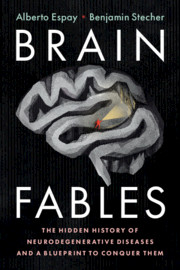Book contents
- Brain Fables
- Brain Fables
- Copyright page
- Dedication
- Contents
- Preface 1 – The Question
- Preface 2 – Enter Patient
- Acknowledgements
- Special Thanks from Benjamin Stecher
- Chapter 1 The Shaky Six and the “Second Reality”
- Chapter 2 Pieces of a Puzzle?
- Chapter 3 Disease “Redefinition”: A Tough Pill to Swallow
- Chapter 4 Disease Subtypes: The Promise and the Fallacy
- Chapter 5 Protein Paradox
- Chapter 6 The Fault in Our Models
- Chapter 7 Biomarkers: The Promise and the Fallacy
- Chapter 8 Lessons from Oncology
- Chapter 9 Symptomatic vs. Disease-Modifying Therapies
- Chapter 10 The Hypothesis That Refuses to Die
- Chapter 11 Our Living Dissonance
- Chapter 12 The Scientific and Lay Narratives
- Chapter 13 Challenges Viewed from Afar
- Chapter 14 The Moonshot: Population-Based Studies of Aging
- Chapter 15 Predictions for the 2020s and Beyond
- Epilogue
- Note Added at Press Time – Reviving LOF
- References
- Index
Chapter 12 - The Scientific and Lay Narratives
Published online by Cambridge University Press: 29 June 2020
- Brain Fables
- Brain Fables
- Copyright page
- Dedication
- Contents
- Preface 1 – The Question
- Preface 2 – Enter Patient
- Acknowledgements
- Special Thanks from Benjamin Stecher
- Chapter 1 The Shaky Six and the “Second Reality”
- Chapter 2 Pieces of a Puzzle?
- Chapter 3 Disease “Redefinition”: A Tough Pill to Swallow
- Chapter 4 Disease Subtypes: The Promise and the Fallacy
- Chapter 5 Protein Paradox
- Chapter 6 The Fault in Our Models
- Chapter 7 Biomarkers: The Promise and the Fallacy
- Chapter 8 Lessons from Oncology
- Chapter 9 Symptomatic vs. Disease-Modifying Therapies
- Chapter 10 The Hypothesis That Refuses to Die
- Chapter 11 Our Living Dissonance
- Chapter 12 The Scientific and Lay Narratives
- Chapter 13 Challenges Viewed from Afar
- Chapter 14 The Moonshot: Population-Based Studies of Aging
- Chapter 15 Predictions for the 2020s and Beyond
- Epilogue
- Note Added at Press Time – Reviving LOF
- References
- Index
Summary
An editorial perfectly timed as we approached the final work on this book was published in the October 2019 issue of Lancet Neurology. With the title, “Re-aligning scientific and lay narratives of Alzheimer’s disease,” several Alzheimer’s investigators pointed out a discrepancy between the narratives circulated among Alzheimer’s patient advocates and those in academic circles. The advocates’ narrative centers around the belief that each case of Alzheimer’s is its own unique disease; the scientific narrative, while acknowledging the heterogeneity, is based on a “theory of everything,” the overarching path to Alzheimer’s that can be generally applied to all cases.
That second narrative, in part because of the esteemed researchers that tell it, attracts the lion’s share of funding. It portrays neuroscience as being on the brink of treatments to slow down Alzheimer’s. All that is needed is larger, more resource-intensive studies into what is being done to address everyone’s Alzheimer’s disease.
- Type
- Chapter
- Information
- Brain FablesThe Hidden History of Neurodegenerative Diseases and a Blueprint to Conquer Them, pp. 111 - 124Publisher: Cambridge University PressPrint publication year: 2020



